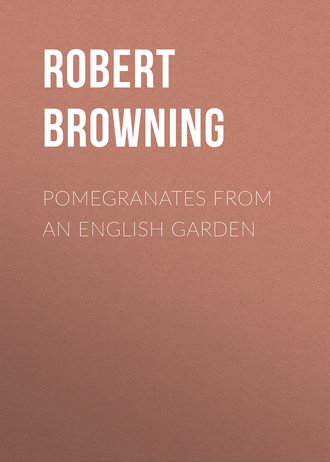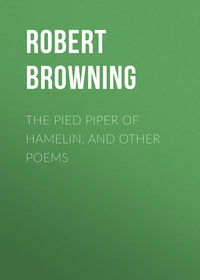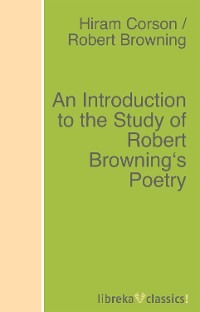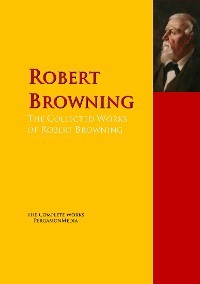 полная версия
полная версияPomegranates from an English Garden
The musician “has been extemporizing,” – pouring out his whole soul through the keys of his organ, and from that state of ecstasy he suddenly awakes and cries out, “Would that the structure brave, the manifold music I build … might tarry!” It has been no mere “volume,” but a “palace” of sound. As Solomon (according to the well-known legend) summoned all spirits from above and from below, and all creatures of the earth, to build him a palace at once, so by a touch, “calling the keys to their work,” he has summoned demons of the bass, angels of the treble, earth creatures of the middle tones, who, by eager and tumultuous and yet harmoniously united efforts, have caused “the pinnacled glory” to “rush into sight” (stanzas 1-3).
Into sight? There was far more in it than could be seen. As the soul of the musician ascended from earth, heaven descended on him; its stars crowned his work; its moons, its suns were close beside him – “there was no more near nor far” (4). And the boundaries of time, as well as the limits of space, were gone. The absolute, the perfect was reached; and to this palace of perfection had flocked “presences plain in the place,” from the far Future and from the mystic Past. “There was no more sea” – no more distance or separation – all one, together, perfect (5). Reached how? Through music – the only one of the arts that leads into the region of the absolute and perfect, its effects not springing from causes the operation of which can be traced, and the law of their production defined, but responding directly to the will, even as creation responded to the fiat of God. Out of such simple elements can that be evoked, which should lead those who “consider” these things to “bow the head” (6, 7).
But was it only for a moment? Is it gone? Forever? (8).
I turn to God, and know it cannot be. Then follows that glorious passage, one of the finest in any language, every word of which should be studied, beginning – “There shall never be one lost good!” on to the end of stanza 11, which is the true climax of the poem.
The last stanza may be compared to the closing one of “Saul.” It is the return from the empyrean to the plain of common life. Let some musical friend show how at the cadence of a very grand piece he would feel his way down the chromatic scale, and then pause on that poignant discord, known as “the minor ninth,” effecting, as it were, a separation (“alien ground”) from the heights just descended, and giving thus the opportunity of looking up once more before a resting-place is found in “the common chord,” – “the C major of this life.”
This is a poem which should be read over and over till the music of it has fairly entered the soul.
It has become common now to speak slightingly of those representations of heaven which make large use of music to give them body in our thought, as if the idea intended to be conveyed were that the joy of heaven was to consist in an endless idle singing, a concert without a finale; but this easy criticism is surely too disregardful of the distinctive feature of music so strikingly set forth in this poem – viz., that it is the only one of the arts which while strongly appealing to sense, yet in its essence belongs to the realm of the unseen, so that it is in fact the only symbol within the range of man’s experience which can even suggest the absolute, the perfect, the pure heavenly.
The following passage, from the “Memorials of Frances Ridley Havergal,” (p. 151) is so strikingly illustrative of “Abt Vogler,” that we cannot forbear quoting it: —
“In the train I had one of those curious musical visions which only very rarely visit me. I hear strange and very beautiful chords, generally full, slow and grand, succeeding each other in most interesting sequences. I do not invent them, I could not; they pass before my mind, and I only listen. Now and then my will seems aroused when I see ahead how some fine resolution might follow, and I seem to will that certain chords should come, and then they do come; but then my will seems suspended again, and they go on quite independently. It is so interesting, the chords seem to fold over each other, and die away down into music of infinite softness, and then they unfold and open out, as if great curtains were being withdrawn one after another, widening the view, till, with a gathering power and intensity and fulness, it seems as if the very skies were being opened out before one, and a sort of great blaze and glory of music, such as my outward ears never heard, gradually swells out in perfectly sublime splendour. This time there was an added feature; I seemed to hear depths and heights of sound beyond the scale which human ears can receive, keen, far-up octaves, like vividly twinkling starlight of music, and mighty slow vibrations of gigantic strings going down into grand thunders of depths, octaves below anything otherwise appreciable as musical notes. Then, all at once, it seemed as if my soul had got a new sense, and I could see this inner music as well as hear it; and then it was like gazing down into marvellous abysses of sound, and up into dazzling regions of what, to the eye, would have been light and colour, but to this new sense was sound.”
ONE WORD MORE
TO E. B. BLondon, September, 1855IThere they are, my fifty men and womenNaming me the fifty poems finished!Take them, love, the book and me together:Where the heart lies, let the brain lie also.IIRafael made a century of sonnets,Made and wrote them in a certain volumeDinted with the silver-pointed pencilElse he only used to draw Madonnas:These, the world might view – but one, the volume.Who that one, you ask? Your heart instructs you.Did she live and love it all her life-time?Did she drop, his lady of the sonnets,Die and let it drop beside her pillowWhere it lay in place of Rafael’s glory,Rafael’s cheek so duteous and so loving —Cheek, the world was wont to hail a painter’s,Rafael’s cheek, her love had turned a poet’s?IIIYou and I would rather read that volume,(Taken to his beating bosom by it)Lean and list the bosom-beats of Rafael,Would we not? than wonder at Madonnas —Her, San Sisto names, and Her, Foligno,Her, that visits Florence in a vision,Her, that’s left with lilies in the Louvre —Seen by us and all the world in circle.IVYou and I will never read that volume.Guido Reni, like his own eye’s apple,Guarded long the treasure-book and loved it.Guido Reni dying, all BolognaCried, and the world cried too “Ours, the treasure!”Suddenly, as rare things will, it vanished.VDante once prepared to paint an angel:Whom to please? You whisper “Beatrice.”While he mused and traced it and retraced it,(Peradventure with a pen corrodedStill by drops of that hot ink he dipped for,When, his left hand i’ the hair o’ the wicked,Back he held the brow and pricked its stigma,Bit into the live man’s flesh for parchment,Loosed him, laughed to see the writing rankle,Let the wretch go festering through Florence) —Dante, who loved well because he hated,Hated wickedness that hinders loving,Dante standing, studying his angel, —In there broke the folk of his Inferno.Says he – “Certain people of importance”(Such he gave his daily dreadful line to)“Entered and would seize, forsooth, the poet.”Says the poet – “Then I stopped my painting.”VIYou and I would rather see that angel,Painted by the tenderness of Dante,Would we not? – than read a fresh Inferno.VIIYou and I will never see that picture.While he mused on love and Beatrice,While he softened o’er his outlined angel,In they broke, those “people of importance:”We and Bice bear the loss for ever.VIIIWhat of Rafael’s sonnets, Dante’s picture?This: no artist lives and loves, that longs notOnce, and only once, and for one only,(Ah, the prize!) to find his love a languageFit and fair and simple and sufficient —Using nature that’s an art to others,Not, this one time, art that’s turned his nature.Ay, of all the artists living, loving,None but would forego his proper dowry, —Does he paint? he fain would write a poem, —Does he write? he fain would paint a picture,Put to proof art alien to the artist’s,Once, and only once, and for one only.So to be the man and leave the artist,Gain the man’s joy, miss the artist’s sorrow.IXWherefore? Heaven’s gift takes earth’s abatement.He who smites the rock and spreads the water,Bidding drink and live a crowd beneath him,Even he, the minute makes immortal,Proves, perchance, but mortal in the minute.Desecrates, belike, the deed in doing.While he smites, how can he but remember,So he smote before, in such a peril,When they stood and mocked – “Shall smiting help us?”When they drank and sneered – “A stroke is easy!”When they wiped their mouths and went their journey,Throwing him for thanks – “But drought was pleasant.”Thus old memories mar the actual triumph;Thus the doing savours of disrelish;Thus achievement lacks a gracious somewhat;O’er-importuned brows becloud the mandate,Carelessness or consciousness – the gesture.For he bears an ancient wrong about him,Sees and knows again those phalanxed faces,Hears, yet one time more, the ’customed prelude —“How should’st thou, of all men, smite, and save us?”Guesses what is like to prove the sequel —“Egypt’s flesh-pots – nay, the drought was better.”XOh, the crowd must have emphatic warrant!Theirs, the Sinai-forehead’s cloven brilliance,Right-arm’s rod-sweep, tongue’s imperial fiat.Never dares the man put off the prophet.XIDid he love one face from out the thousands,(Were she Jethro’s daughter, white and wifely,Were she but the Æthiopian bond-slave,)He would envy yon dumb patient camel,Keeping a reserve of scanty waterMeant to save his own life in the desert;Ready in the desert to deliver(Kneeling down to let his breast be opened)Hoard and life together for his mistress.XIII shall never, in the years remaining,Paint you pictures, no, nor carve you statues,Make you music that should all-express me;So it seems: I stand on my attainment.This of verse alone, one life allows me;Verse and nothing else have I to give you.Other heights in other lives, God willing:All the gifts from all the heights, your own, love!XIIIYet a semblance of resource avails us —Shade so finely touched, love’s sense must seize it.Take these lines, look lovingly and nearly,Lines I write the first time and the last time.He who works in fresco, steals a hair-brush,Curbs the liberal hand, subservient proudly,Cramps his spirit, crowds its all in little,Makes a strange art of an art familiar,Fills his lady’s missal-marge with flowerets.He who blows through bronze, may breathe through silver,Fitly serenade a slumbrous princess.He who writes, may write for once as I do.XIVLove, you saw me gather men and women,Live or dead or fashioned by my fancy,Enter each and all, and use their service,Speak from every mouth, – the speech, a poem.Hardly shall I tell my joys and sorrows,Hopes and fears, belief and disbelieving:I am mine and yours – the rest be all men’s,Karshish, Cleon, Norbert and the fifty.Let me speak this once in my true person,Not as Lippo, Roland or Andrea,Though the fruit of speech be just this sentence —Pray you, look on these my men and women,Take and keep my fifty poems finished;Where my heart lies, let my brain lie also!Poor the speech; be how I speak, for all things.XVNot but that you know me! Lo, the moon’s self!Here in London, yonder late in Florence,Still we find her face, the thrice-transfigured.Curving on a sky imbrued with colour,Drifted over Fiesole by twilight,Came she, our new crescent of a hair’s-breadth.Full she flared it, lamping Samminiato,Rounder ’twixt the cypresses and rounder,Perfect till the nightingales applauded.Now, a piece of her old self, impoverished.Hard to greet, she traverses the houseroofs.Hurries with unhandsome thrift of silver,Goes dispiritedly, glad to finish.XVIWhat, there’s nothing in the moon note-worthy?Nay: for if that moon could love a mortal,Use, to charm him (so to fit a fancy)All her magic (’tis the old sweet mythos)She would turn a new side to her mortal,Side unseen of herdsman, huntsman, steersman —Blank to Zoroaster on his terrace,Blind to Galileo on his turret,Dumb to Homer, dumb to Keats – him, even!Think, the wonder of the moon-struck mortal —When she turns round, comes again in heaven,Opens out anew for worse or better!Proves she like some portent of an icebergSwimming full upon the ship it founders,Hungry with huge teeth of splintered crystals?Proves she as the paved work of a sapphireSeen by Moses when he climbed the mountain?Moses, Aaron, Nadab and AbihuClimbed and saw the very God, the Highest,Stand upon the paved work of a sapphire.Like the bodied heaven in his clearnessShone the stone, the sapphire of that paved work,When they ate and drank and saw God also!XVIIWhat were seen? None knows, none ever shall knowOnly this is sure – the sight were other,Not the moon’s same side, born late in Florence,Dying now impoverished here in London.God be thanked, the meanest of his creaturesBoasts two soul-sides, one to face the world with,One to show a woman when he loves her!XVIIIThis I say of me, but think of you, Love!This to you – yourself my moon of poets!Ah, but that’s the world’s side, there’s the wonder,Thus they see you, praise you, think they know you!There, in turn I stand with them and praise you —Out of my own self, I dare to phrase it.But the best is when I glide from out them,Cross a step or two of dubious twilight,Come out on the other side, the novelSilent silver lights and darks undreamed of,Where I hush and bless myself with silence.XIXOh, their Rafael of the dear Madonnas,Oh, their Dante of the dread Inferno,Wrote one song – and in my brain I sing it,Drew one angel – borne, see, on my bosom!“Men and Women,” a collection of fifty poems, first published in 1855, is probably the best known of our author’s numerous volumes. Some of the very finest of his work is in it. To this collection “One Word More” is an appendix, in the form of a dedication of the fifty poems to his wife, Elizabeth Barrett Browning. As we learn from stanza 13, this work differs from all others in having been dashed off, the first time of writing being also the last time; and yet (such is the inspiration of love) it stands with the very highest of his works. It needs careful reading, but presents no such difficulties as “Abt Vogler.”
Rafael, painter for the world, becomes for once a poet for his dearest. If only these wonderful sonnets could be found, how we should prize them; but the volume is hopelessly lost (stanzas 2-4).
Dante, poet for the world, prepares for once to paint an angel for his dearest. But, alas! he is hindered by the breaking in of some “people of importance” of the city, the sort of people who served as character models for “the folk of his Inferno” (5-7).
There would evidently be less of art and more of nature in such an outpouring of soul; and, therefore, the true artist would long to do it “once, and only once, and for one only.” “The man’s joy” would be found in the mere utterance of his soul to his dearest, without any thought of art, which, to the true artist, lifts so high an ideal that his shortcoming is always a “sorrow” (8).
So is it with the prophet, the exercise of whose high calling can never be dissociated from its burdens and cares (9). If he dared, which he may not (10), how gladly for the one that he loved would he “put off the prophet” and provide water, not by the forth putting of power, but simply as the man, through the self-denial of love (11).
Browning himself has only the one art, so cannot leave his poetry to paint, or carve, or “make music” (12); but as the nearest equivalent possible to him will write “once, and only once, and for one only,” a purely extemporaneous production (13), which shall not, like his other works, be dramatic in principle, but spoken in his own “true person” (14).
Then follows the wonderful moon illustration, so marvellously wrought out, based upon the familiar astronomical fact that, through all her phases and movements she always presents exactly the same face to the earth (15), the other remaining entirely concealed (“unseen of herdsman, huntsman, steersman,” &c.), and therefore available as a new revelation (who knows of what grandeur?) for the loved and specially-favoured mortal (16).
The application of the illustration in stanzas 17 and 18 is exquisitely beautiful, as is the gem-like quatrain with which the poem closes.
SAUL
[The three selections which fill up the rest of this little volume are given as specimens of the distinctively Christian poems of our author. The first gives us Christ in the Old Testament; the second, Christ in the New; the third, Christianity in its essential truth and practical application. As only a portion of “Saul” can be given, a few words will be necessary to prepare the reader unacquainted with the whole for taking up the thread at the 14th stanza, from which, in the selection, the poem is continued uninterruptedly to the end.]
Young David is telling over to himself (see “my voice to my heart,” in stanza 14) the story of his mission to Saul, when, as an inspired poet-musician, he charmed the evil spirit away from him. Stanza 16, consisting of one line, is the hinge of the entire poem; for David has just reached the point where, after several unsuccessful, or very partially successful, attempts – first, by playing one and another and another tune, which might awaken some chord in the apathetic spirit of the king, and then by singing, accompanied by the harp, first, of the joy of life, then of the splendid results of a royal life like Saul’s in the great future of the world – he at last, the truth coming upon him, strikes the high key where full relief is found. As he approaches this crisis in the tale, he cannot go on without an earnest invocation for help to tell what he had been so wonderfully led to sing: —
XIVAnd behold while I sang … but O Thou who didst grant me, that day,And, before it, not seldom hast granted thy help to essay,Carry on and complete an adventure, – my shield and my swordIn that act where my soul was thy servant, thy word was my word, —Still help me, who then at the summit of human endeavourAnd scaling the highest, man’s thought could, gazed hopeless as everOn the new stretch of heaven above me – till, mighty to save,Just one lift of thy hand cleared that distance – God’s throne from man’s grave!Let me tell out my tale to its ending – my voice to my heartWhich scarce dares believe in what marvels last night I took part,As this morning I gather the fragments, alone with my sheep!And fear lest the terrible glory evanish like sleep,For I wake in the grey dewy covert, while Hebron upheavesDawn struggling with night on his shoulder, and Kidron retrievesSlow the damage of yesterday’s sunshine.XVI say then, – my songWhile I sang thus, assuring the monarch, and, ever more strong,Made a proffer of good to console him – he slowly resumedHis old motions and habitudes kingly. The right hand replumedHis black locks to their wonted composure, adjusted the swathesOf his turban, and see – the huge sweat that his countenance bathes,He wipes off with the robe; and he girds now his loins as of yore,And feels slow for the armlets of price, with the clasp set before.He is Saul, ye remember in glory, – ere error had bentThe broad brow from the daily communion; and still, though much spentBe the life and the bearing that front you, the same, God did choose,To receive what a man may waste, desecrate, never quite lose.So sank he along by the tent-prop, still, stayed by the pileOf his armour and war-cloak and garments, he leaned there awhile,And sat out my singing, – one arm round the tent-prop, to raiseHis bent head, and the other hung slack – till I touched on the praiseI foresaw from all men in all time, to the man patient there;And thus ended, the harp falling forward. Then first I was ’wareThat he sat, as I say, with my head just above his vast kneesWhich were thrust out on each side around me, like oak roots which pleaseTo encircle a lamb when it slumbers. I looked up to knowIf the best I could do had brought solace: he spoke not, but slowLifted up the hand slack at his side, till he laid it with careSoft and grave, but in mild settled will, on my brow: thro’ my hairThe large fingers were pushed, and he bent back my head, with kind power —All my face back, intent to peruse it, as men do a flower.Thus held he me there with his great eyes that scrutinized mine —And oh, all my heart how it loved him! but where was the sign?I yearned – “Could I help thee, my father, inventing a bliss,“I would add, to that life of the past, both the future and this;“I would give thee new life altogether, as good, ages hence,“As this moment, – had love but the warrant, love’s heart to dispense!”XVIThen the truth came upon me. No harp more – no song more! outbroke —XVII“I have gone the whole round of creation: I saw and I spoke;“I, a work of God’s hand for that purpose, received in my brain“And pronounced on the rest of his handwork – returned him again“His creation’s approval or censure: I spoke as I saw,“Reported, as man may of God’s work – all’s love, yet all’s law.“Now I lay down the judgeship he lent me. Each faculty tasked“To perceive him has gained an abyss, where a dew-drop was asked.“Have I knowledge? confounded it shrivels at Wisdom laid bare.“Have I forethought? how purblind, how blank, to the Infinite Care!“Do I task any faculty highest, to image success?“I but open my eyes, – and perfection, no more and no less,“In the kind I imagined, full-fronts me, and God is seen God“In the star, in the stone, in the flesh, in the soul and the clod.“And thus looking within and around me, I ever renew“(With that stoop of the soul which in bending upraises it too)“The submission of man’s nothing-perfect to God’s all-complete,“As by each new obeisance in spirit, I climb to his feet.“Yet with all this abounding experience, this deity known,“I shall dare to discover some province, some gift of my own.“There’s a faculty pleasant to exercise, hard to hood-wink,“I am fain to keep still in abeyance, (I laugh as I think)“Lest, insisting to claim and parade in it, wot ye, I worst“E’en the Giver in one gift. – Behold, I could love if I durst!“But I sink the pretension as fearing a man may o’ertake“God’s own speed in the one way of love: I abstain for love’s sake.– “What, my soul? see thus far and no farther? when doors great and small,“Nine-and-ninety flew ope at our touch, should the hundredth appal?“In the least things have faith, yet distrust in the greatest of all?“Do I find love so full in my nature, God’s ultimate gift,“That I doubt his own love can compete with it? Here, the parts shift?“Here, the creature surpass the Creator, – the end what began?“Would I fain in my impotent yearning do all for this man,“And dare doubt he alone shall not help him, who yet alone can?“Would it ever have entered my mind, the bare will, much less power,“To bestow on this Saul what I sang of, the marvellous dower“Of the life he was gifted and filled with? to make such a soul,“Such a body, and then such an earth for insphering the whole?“And doth it not enter my mind (as my warm tears attest),“These good things being given, to go on, and give one more, the best?“Ay, to save and redeem and restore him, maintain at the height“This perfection, – succeed, with life’s dayspring, death’s minute of night:“Interpose at the difficult minute, snatch Saul, the mistake,“Saul, the failure, the ruin he seems now, – and bid him awake“From the dream, the probation, the prelude, to find himself set“Clear and safe in new light and new life, – a new harmony yet“To be run and continued, and ended – who knows? – or endure!“The man taught enough by life’s dream, of the rest to make sure;“By the pain-throb, triumphantly winning intensified bliss,“And the next world’s reward and repose, by the struggles in this.XVIII“I believe it! ’Tis thou, God, that givest, ’tis I who receive:“In the first is the last, in thy will is my powder to believe.“All’s one gift: thou canst grant it, moreover, as prompt to my prayer,“As I breathe out this breath, as I open these arms to the air.“From thy will, stream the worlds, life and nature, thy dread Sabaoth:“I will? – the mere atoms despise me! Why am I not loth“To look that, even that in the face too? Why is it I dare“Think but lightly of such impuissance? What stops my despair?“This; – ’tis not what man Does which exalts him, but what man Would do!“See the King – I would help him, but cannot, the wishes fall through.“Could I wrestle to raise him from sorrow, grow poor to enrich,“To fill up his life, starve my own out, I would – knowing which,“I know that my service is perfect. Oh, speak through me now!“Would I suffer for him that I love? So wouldst thou – so wilt thou!“So shall crown thee the topmost, ineffablest, uttermost crown —“And thy love fill infinitude wholly, nor leave up nor down“One spot for the creature to stand in! It is by no breath,“Turn of eye, wave of hand, that salvation joins issue with death!“As thy love is discovered almighty, almighty be proved“Thy power, that exists with and for it, of being beloved!“He who did most shall bear most; the strongest shall stand the most weak.“’Tis the weakness in strength that I cry for! my flesh that I seek“In the Godhead! I seek and I find it. O Saul, it shall be“A Face like my face that receives thee; a Man like to me,“Thou shalt love and be loved by, for ever: a Hand like this hand“Shall throw open the gates of new life to thee! See the Christ stand!”XIXI know not too well how I found my way home in the night.There were witnesses, cohorts about me, to left and to right,Angels, powers, the unuttered, unseen, the alive, the aware:I repressed, I got through them as hardly, as strugglingly there,As a runner beset by the populace famished for news —Life or death. The whole earth was awakened, hell loosed with her crews;And the stars of night beat with emotion, and tingled and shotOut in fire the strong pain of pent knowledge: but I fainted not,For the Hand still impelled me at once and supported, suppressedAll the tumult, and quenched it with quiet, and holy behest,Till the rapture was shut in itself, and the earth sank to rest.Anon at the dawn, all that trouble had withered from earth —Not so much, but I saw it die out in the day’s tender birth;In the gathered intensity brought to the grey of the hills;In the shuddering forests’ held breath; in the sudden wind-thrills;In the startled wild beasts that bore off, each with eye sidling still,Though averted with wonder and dread; in the birds stiff and chillThat rose heavily as I approached them, made stupid with awe:E’en the serpent that slid away silent – he felt the new law.The same stared in the white humid faces upturned by the flowers;The same worked in the heart of the cedar and moved the vine-bowers:And the little brooks witnessing murmured, persistent and low,With their obstinate, all but hushed voices – “E’en so, it is so!”Stanza 14.– Observe the meeting of the human and divine in the poet-prophet’s inspiration. As poet, his powers were in their fullest exercise, and still there was an unfathomable heaven of the unknown above him, till “one lift of Thy hand cleared that distance.”






